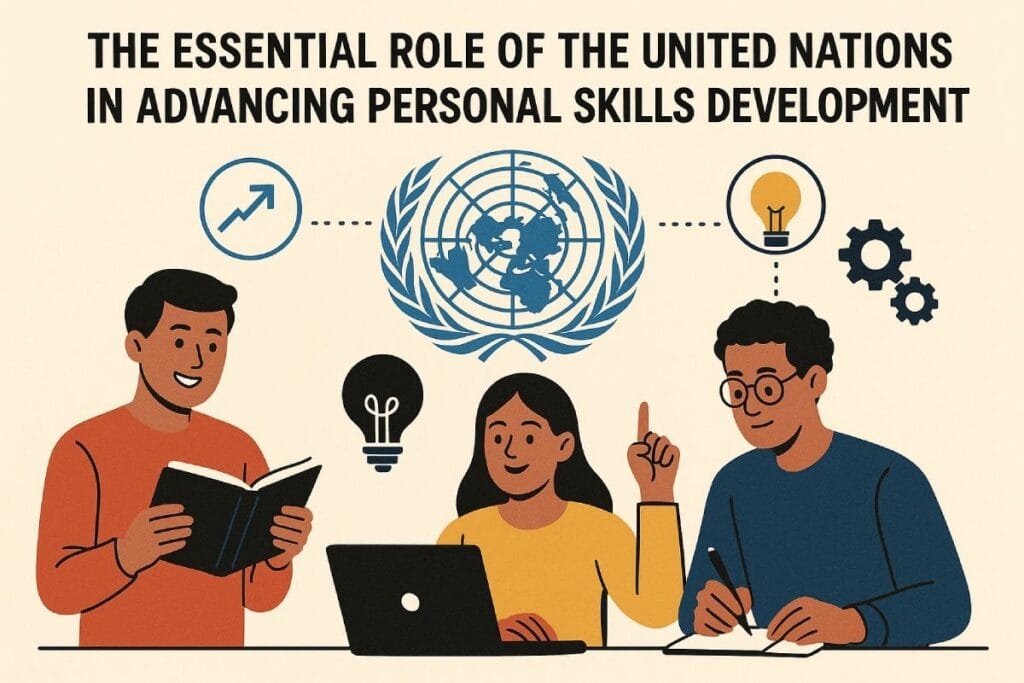The Essential Role of the United Nations in Advancing Personal Skills Development

In an increasingly interconnected and competitive world, personal skills — such as critical thinking, communication, adaptability, and digital literacy — are essential for individual empowerment, economic resilience, and global development. The United Nations (UN), through its vast network of specialized agencies and international initiatives, plays a pivotal role in fostering these competencies. By championing inclusive education, lifelong learning, and equitable access to skills training, the UN helps millions around the world unlock their potential and actively contribute to sustainable development.
📘 Education as the Cornerstone of Skills Development
The United Nations Educational, Scientific and Cultural Organization (UNESCO) has long recognized education as a fundamental human right and a critical driver of personal and societal transformation. Through frameworks such as Education for Sustainable Development (ESD) and the Global Education Monitoring (GEM) Report, UNESCO promotes policies and practices that integrate essential life skills into formal and non-formal education systems. These include problem-solving, creativity, cooperation, and emotional intelligence — all key components of 21st-century competencies.
Furthermore, the UN’s Sustainable Development Goal 4 (SDG 4) aims to “ensure inclusive and equitable quality education and promote lifelong learning opportunities for all.” This goal underscores the importance of not just academic achievement but also functional and personal skills that enhance employability, civic participation, and individual well-being.
🌱 Lifelong Learning and Youth Empowerment
Beyond traditional education, the UN strongly advocates for lifelong learning as a strategy for adapting to the rapid changes brought about by globalization and technology. The United Nations Institute for Training and Research (UNITAR) and the International Labour Organization (ILO) offer targeted skill-building programs focused on leadership, entrepreneurship, digital competencies, and green skills — particularly for youth, women, and marginalized groups.
Through its Youth2030 strategy, the UN positions young people as key partners in achieving the Sustainable Development Goals. It facilitates programs that promote digital inclusion, vocational training, and soft skill development to bridge the gap between education and employment. By empowering youth with relevant skills, the UN strengthens resilience, reduces inequalities, and fuels innovation across sectors.
🌍 Global Cooperation for Skills Equity
The United Nations also fosters multilateral collaboration to address global disparities in skills development. Initiatives like the Global Skills Partnership and partnerships with organizations such as the OECD, World Bank, and private-sector actors focus on scaling up training opportunities in developing countries. These efforts aim to align education and training systems with labor market demands, especially in sectors like healthcare, ICT, and sustainable agriculture.
Moreover, the UN’s efforts to integrate digital tools and open educational resources (OER) enable broader access to self-paced learning worldwide. These digital solutions help individuals acquire skills regardless of geographic location, socio-economic background, or prior educational attainment — making skill development more inclusive and adaptive to modern needs.
✨ Conclusion
The United Nations plays a foundational role in shaping a world where personal skills are universally recognized as catalysts for dignity, equality, and progress. By promoting inclusive education, championing lifelong learning, and fostering global cooperation, the UN ensures that individuals are better equipped to navigate change, seize opportunities, and contribute meaningfully to society. As the future of work and life becomes increasingly dynamic, the UN’s commitment to skills development remains a beacon of hope for global human capital.
Source : Medium.com




